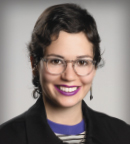In early 2023, I began experiencing serious symptoms that were not easily explained away, including deep vein thrombosis in my left leg, extreme weight loss, bruising, wheezing, and shortness of breath so severe that it was difficult to walk my dog more than a few feet without gasping for air. For 5 months, I tried getting my concerns addressed by several doctors. Finally, after much cajoling, I convinced a physician to take an imaging scan of my lungs.
He called the same day with the results and told me to get to the emergency room immediately. After a series of additional imaging scans, which showed a 5-cm mass on my upper right lobe, lesions across my left lung, multiple pulmonary embolisms in my lungs, and suspicious masses throughout my body (including my spine, pelvis, and brain), I was given a diagnosis of stage IV non–small cell lung cancer (NSCLC).
I was told I likely had 3 months to live and to put my affairs in order. I was just 26 years old.
Taking Charge
I was a never-smoker, so the diagnosis was totally unexpected, and the fear I initially felt was paralyzing. My body was in shock from widespread disease as well as the sudden onslaught of medications and a single round of a platinum-based chemotherapy, which caused my platelets to drop to dangerously low levels. I also developed sepsis, and my body was retaining 40 pounds of fluid, making it even harder for me to breathe. In a panic, I called my oncologist who said, “That’s just cancer. You have to learn to live with it.”

The work scientists are doing in next-generation tyrosine kinase inhibitors is drastically changing what it means to live with late-stage NSCLC, and I’m grateful.— DREA CORNEJO
Tweet this quote
After transferring my care to another cancer center, I learned that my body wasn’t properly regulating fluid due to a heart-related issue. With the help of a pleural catheter and diuretics, the fluid buildup was brought under control. But I often wonder if I hadn’t made the decision to transfer my care whether I would be alive today.
Focusing on the Present
A genomic test of the tumor found that I have ROS1-mutated NSCLC, a rare subtype, affecting only between 1% and 3% of patients.1 I was prescribed the tyrosine kinase inhibitor entrectinib, which kept the cancer stable for more than 3 years. I have recently experienced oligoprogression and am now receiving lorlatinib.
On the days I’m feeling especially anxious, I remind myself that all I can do is focus on the things I can control. If my expiration date is 1 month from now or 50 years from now, I would rather spend the time doing what I enjoy instead of worrying about all of the what-ifs that might happen in the future.
Finding Online Support
What has helped get me through these difficult past 3 years is an online community my brother introduced me to called The ROS1ders (www.theros1ders.org), which is made up of a global group of patients diagnosed with ROS1-positive metastatic cancer. Through the website, I’ve met many survivors not just living with advanced cancer for 5, 10, and more years but thriving. Their experiences have shown me that despite this difficult hand I’ve been dealt, it is possible not just to live but to thrive with advanced disease. Being able to meet these incredible survivors, some of whom have my exact same diagnosis, has been a lifeline I never could have imagined when I received my diagnosis.
Through The ROS1ders, I’ve become educated about advances in research in my cancer type and have even had the opportunity to meet with some of the leading researchers in this field. The work these scientists are doing in next-generation tyrosine kinase inhibitors is drastically changing what it means to live with late-stage NSCLC, and I’m grateful.
Living My Best Life
I’m not the type of person who is ever going to use toxic positivity to deny or minimize the negative emotions surrounding a life-threatening diagnosis. I am never going to say, “I’m glad I have cancer.” However, I am glad that cancer has given me a newfound perspective on how to live my best life.
Before cancer, I was often weighed down by adult expectations that really were not that important. Now, I’m finally free to be the person I’ve always wanted to be: the person who takes risks and lives in the moment with intention and purpose. I don’t think I would have reached this level of comfort in my life if it weren’t for cancer and how I’ve chosen to live my life as a cancer survivor.
Treating Patients With Compassion and Respect
Throughout this journey, the hardest moments for me weren’t just the feelings of anxiety surrounding the next imaging scan or coping with the side effects from treatments; they were the words used by some health-care professionals to describe my prognosis. One particular physician spoke to me in a way that left no room for hope. For him, seeing me may have been just another appointment he had to check off his list. For me, his words have lingered like a scar that cannot be removed.
Cancer is already unimaginably hard. Having the right medical team—one that treats you like a person and not a lost cause—makes all the difference.
REFERENCE
1. Gendarme S, Bylicki O, Chouaid C, et al: ROS-1 fusions in non-small-cell lung cancer: Evidence to date. Curr Oncol 29:641-658, 2022.
Ms. Cornejo, 29, lives in St. Petersburg, Florida, with her partner and two dogs. She is a video journalist for washingtonpost.com, where she reports on the adolescent and young adult oncology community.
Editor’s Note: Columns in the Patient’s Corner are based solely on information The ASCO Post received from patients and should be considered anecdotal.

